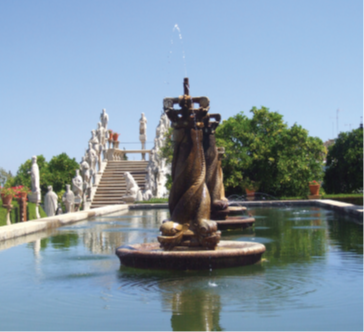The City of Castelo Branco
The origins of Castelo Branco go back to many centuries ago.
Several archaeological artefacts were found confirming the presence of the Romans in the region. The architecture of the “Medieval City”, one of the richest in the country, also confirms the presence of the Templars in the city.
The city centre and the Jardim do Paço (Bishop’s Garden), are some of the most interesting places to visit in a city that combines modern trends with a rich historical and cultural past.

Through the centuries the city has grown and today Castelo Branco is capital of the district. In 2007, Castelo Branco was considered one of the best cities to live in Portugal and the 7th best city to live in Europe, due to its excellent quality of life.
Concerning economic activity, there has been an enormous growth of all industrial activities and services, which confirms Castelo Branco’s historic role as the capital of inland Portugal.
The city is served by many ways and means of transportation (train/bus/car), which allows the modernisation of the city and provides jobs in many areas.
Castelo Branco is a city turned to the future. The city pretends to adjust to the European context level, with strong bets in youth, which is the main population of the city. To do so, it’s necessary to provide young people, not only with many and varied equipments to the practice of sports, but also with professional education and access to education.
Accomodation and services
Students coming from abroad have two housing options: Students’ halls of residence or private housing, where they can rent a flat to live alone or to share with other fellow students.
The private housing market offers may be consulted at the Housing Database available at the Students’ Union of each School. Rents range from 120 to 200 € per month.
The IPCB maintains 4 halls of residence to provide its students with good accommodations at affordable prices. One hall of residence is located in Idanha-a-Nova. All the rooms are equipped with closets, desks, chairs, beds, and central heating.
The residences are organised in two double bedroom flats with a shower and toilet, and a small hall. Each floor has a kitchen and a laundry room. The monthly rent is around 133 € per person.
The IPCB’s Welfare Service manages the four IPCB’s Halls of Residence. In order to rent a room at the Residence, the student should send an email to sas@ipcb.pt
Students’ Cafeterias and Snack-Bars
The IPCB’s Welfare Service provides affordable meals at the students’ canteens and snack-bars. Each school of the IPCB has a canteen that is open during work days for lunch. For dinner, students have at their disposal the canteen at the School of Education and at the Students’ Residence.
Cost of living
Characterising the cost of living of any country is naturally conditioned by where you live and how you live.
As an estimate, a student in Castelo Branco will need somewhere between 450€ and 550€ per month for accommodation, food, study material and other basic expenses.
Some basic expenses (averages prices)
Meal: 10 € (2,70 € at IPCB canteens)
Ham or cheese sandwich: 1,5 € (1 € at IPCB snack bars)
Fast food (BigMac menu: 5,20€; Telepizza Pizza Cool Cheese (small): 6,25€)
Coffee: 0,6 € (0,4 € at IPCB snack bars)
Bottle of water (0,5 cl): 0,6 €
Milk: 0,90/l
Beer: 0,8€
Bus ticket: 0,95 €
Virtual campus
IPCB is part of a major nationwide electronic University network called e-U. This has enabled the on line creation of online university services, the production and sharing of academic contents, and internet (and intranet) access from inside and outside the IPCB at anytime and from any place.
All campus is covered by a wireless network, and students can use their laptops to access the internet and IPCB’s services from any point in IPCB. There are special workstations that are specifically equipped for the use of this network.
